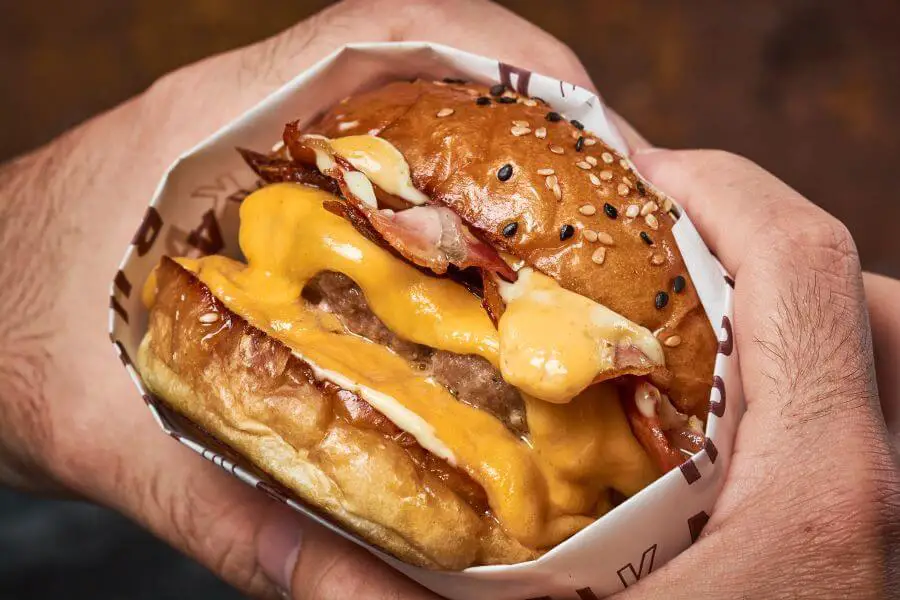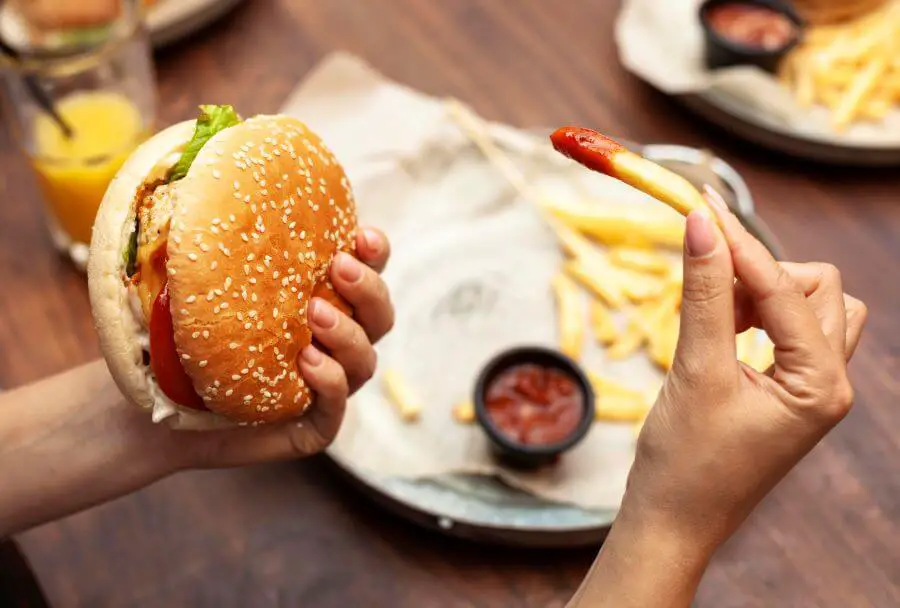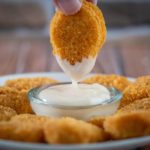McDonald’s, an indomitable force in the fast-food landscape, has served its iconic burgers to billions of customers worldwide for over seven decades.

A characteristic that often piques curiosity and prompts discussion among consumers is the noticeable greasiness of their burgers. Let’s unravel why McDonald’s burgers are so greasy by delving into various contributing factors.
The Multifaceted Role of Grease in McDonald’s Burgers
1. Flavor Enhancement
Fat is a fundamental flavor carrier and imparts food with a greasy quality. It enhances the taste of food by absorbing and retaining flavor compounds that are not soluble in water.
In the context of McDonald’s, the grease or fat in its burgers plays an instrumental role in augmenting the taste of the beef and other ingredients.
When fat is heated, it begins to break down, releasing volatile compounds that contribute to the aroma and flavor of the food. This process, known as rendering, is crucial in creating McDonald’s burgers’ rich, savory flavor profile.
2. Juiciness and Texture
Fat contributes significantly to the juiciness and texture of a burger. When the burger is cooked, the fat within the meat begins to melt, infusing it with moisture and giving it a juicy, tender texture. With enough fat, the burger could be dry and tough.
A burger patty’s specific ratio of lean meat to fat can significantly influence its texture and juiciness. A higher fat content typically results in a juicier, more flavorful burger.
Therefore, the perceived greasiness of McDonald’s burgers could be attributed to the amount of fat in the beef patties, which is necessary to achieve the desired texture and juiciness.
3. Cooking Method
The cooking method can also contribute to the perceived greasiness of a burger. McDonald’s burgers are cooked on a grill, a flat cooking surface that allows the patties to cook in their own rendered fat.
As the fat melts out of the beef during cooking, instead of dripping away as it would on a grill, it stays on the griddle, effectively frying the patties in their fat.
This cooking method produces a greasier final product and contributes to the burgers’ signature flavor and texture.
The direct contact between the patty and the hot griddle creates a crispy, caramelized exterior through a process known as the Maillard reaction. In contrast, the cake’s interior remains juicy from the retained fat.
4. Customer Expectations and Preference
Over the years, consumers have associated fast food with a certain greasiness. The industry has shaped and reinforced this expectation by consumers’ general preference for rich, flavorful foods.

McDonald’s, a significant player in the industry, caters to this preference by serving burgers that align with these expectations.
The greasiness of the burgers contributes to the overall satisfaction and enjoyment of the meal and meets customers’ anticipated taste profile for fast-food burgers.
5. Balance of Flavors
A McDonald’s burger comprises a beef patty, cheese, pickles, ketchup, onions, and a bun. Each of these elements brings its own unique taste to the mix. The grease or fat in the burger helps balance these diverse flavors, creating a harmonious taste profile.
Fat can mellow out the acidity of the pickles and ketchup and complement the sweetness of the onions and the bun. It also enhances the savoriness of the cheese and the beef, resulting in a well-rounded flavor experience.
This balance of flavors is integral to the appeal of McDonald’s burgers, and fat plays a crucial role in achieving it.
6. Mouthfeel and Satiety
Beyond its impact on taste and texture, fat also influences the mouthfeel and satiety of a burger. Fat gives food a creamy, unctuous mouthfeel often perceived as pleasurable.

It also slows down the rate at which the stomach empties, leading to a feeling of fullness and satisfaction. The greasiness of McDonald’s burgers contributes to their mouthfeel and satiety, making them tasty and filling.
This could be another reason McDonald’s opts for a higher fat content in their burgers despite the resultant greasiness.
Health Implications and Industry Trends
While grease or fat can enhance flavor, improve texture, and increase satiety, its health implications cannot be overlooked. High-fat diets have been linked to various health issues, including obesity, heart disease, and certain types of cancer.
As public awareness of these health risks has grown, there’s been increasing scrutiny of the fat content in fast food.
In response to these concerns, McDonald’s, along with other fast-food chains, has committed to reducing the fat content in their food.
This involves a delicate balancing act – maintaining the flavors customers know and love while ensuring their offerings do not contribute to health problems. To strike this balance, innovative strategies are being explored.
These include using leaner cuts of meat, incorporating plant-based alternatives, employing cooking methods that reduce the fat content of the burgers, and developing new recipes that deliver on taste while being lower in fat.
Conclusion
The greasiness of McDonald’s burgers is a complex issue, influenced by various factors ranging from flavor enhancement and texture to customer preferences and cooking methods.
While fat plays a crucial role in making McDonald’s burgers the tasty, satisfying meals that fans across the globe enjoy, it’s clear that striking a balance between taste and health is an ongoing challenge in the fast-food industry.
How brands like McDonald’s navigate this challenge while delivering the products their customers’ love will be a critical factor in their continued success in an increasingly health-conscious world.






